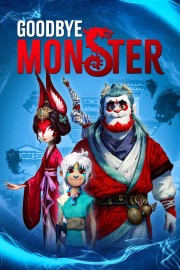Goodbye Monster
**This piece was written during the 2023 WGA and SAG-AFTRA strikes. Without the labor of the writers and actors currently on strike, the movies being covered here wouldn’t exist.
Jianming Huang’s “Goodbye Monster” has some very goofy humor and moments that can sometimes undercut the drama of his film, but I’d be lying if I didn’t admit to this film’s themes of setting ego aside and caring for the person’s anxieties grabbing me. Yes, the film devolves into an ending not unlike “Princess Mononoke,” where hubris has created a creature that only love and light can destroy, but Huang’s film succeeds at getting to its points in a way that is entertaining, even if it’s not profound.
Bai Ze is a medical practitioner on an island of doctors. These aren’t your typical patients, though, nor are they your typical ailments. This is a mystical land, and many of the issues the doctors of the Kunlun Hospital face revolve around the Dark Spirit, which inhabits most people. The head of Kunlun is always cautious, but Bai Ze- his favorite pupil- is brash enough to think he can eliminate the Dark Spirit entirely. When he tries, however, he destroys the island, and is banished from practicing medicine. Even in his banishment, however, Bai Ze continues to work out his ideas, and when he encounters a young boy, Yi, he finds himself on the run, and trying to keep them both safe, while also working at possible redemption.
I like the basic world of “Goodbye Monster” in terms of how it centers around islands of healing, and how healing the body is differentiated from healing the spirit. This film is ultimately about healing the person entirely, and once you realize that, the metaphor of the Dark Spirit- if it isn’t realized early in the film- becomes obvious. The visuals in this film are a mixed bag- I really love the character designs, but the animation doesn’t feel as fluid and lively as some of the best animated films we’ve gotten this year. There are some wonderful moments in this film- like at a healing place that focuses on the spirit more than the physical- but that’s because they are more rooted in the themes than visuals. The third act is where the emotions run strongest, because truths are revealed, and personal jealousy manifests itself into a physical threat that Huang stages quite well, even if it’s nothing we haven’t seen before. Bai Ze is a very self-involved protagonist, but I like the way he’s portrayed, because it allows his growth to come naturally. Overall, “Goodbye Monster” doesn’t provide much that’s unique, but it does give us an entertaining experience, and sometimes an emotional one.










